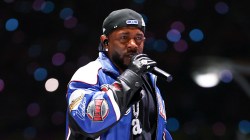Following the success of Jack Harlow’s 2020 debut That’s What They All Say, one thing was clear: Harlow’s coy lyrical tinctures were a hit with the charts and the youth. The conversational back and forth of “Already Best Friends” went wild with TikTok re-enactments and “WHAT’S POPPIN” was a potent mixture of pop-rap bravado that could easily be mixed into a late-night DJ set without anyone batting an eye.
His career began organically enough; he often speaks about how he played shows for disinterested and tiny audiences, and how he’s been releasing music since he was 12 years old. He was a small-town Kentucky kid with massive dreams and a tireless work ethic.
Still, Jack Harlow’s tidy formula felt eerily familiar to white college rappers of the past, albeit his technical skills surpassed a Sammy Adams or Hoodie Allen. While Gen Z celebrated Harlow’s arrival, Millennials found themselves torn as to whether they should embrace him so quickly.
He was signed to Generation Now, an iconic label backed by DJ Drama that added much-needed credibility to his artistry and ultimately, a Grammy Award-nominated feature on Lil Nas X’s “Industry Baby” forever changed his path. Harlow played straight man to Nas X’s colorful croons. It confirmed Harlow could have a lane as more than a moderately successful rapper, opening the door to become a superstar if he played his cards right.
A year later, we’re having a legitimate conversation about whether Jack Harlow is or isn’t one of the biggest rappers in the country. As his sophomore project Come Home The Kids Miss You gained some hype, the question remained if there was more to Jack Harlow than meets the eye.
Unfortunately, Come Home The Kids Miss You doesn’t tell much of a story. This album is about as refreshing as a glass of lukewarm tap water. He has a voice so ubiquitous that it can sound vaguely like Drake’s if he breathes out his mouth enough, but he never fully embodies any of the identities he lays out for himself. Come Home The Kids Miss You, even with its glossy production budget, is a hollow record full of empty calories, and it wouldn’t sting so bad if the Jack Harlow of interviews didn’t so often directly contradict the Jack Harlow heard on records.
“Writers block for me is like I can feel that I’m just writing about nothing,” Harlow told Zane Lowe. “It’s usually when I get lost in just rhyming, and it’s like, ‘Oh this is a fun rhyme scheme,’ that’s when I know I’m blocked is when I just find a crazy rhyme scheme and just hop in and out of that and there’s no cohesion to any of the content.”
Based on that definition, Harlow suffers from writer’s block for most of this record. “Young Harleezy” is snappy and quick, and his lackadaisical flow feels at home over the song’s spacious drums. But “Young Harleezy” is also just an awful nickname, and he rhymes boy with boy eight times in tandem. Or take “Dua Lipa,” which he teased as if it was about the pop singer, but really is about nothing, a marketing strategy pretending to be a real song.
Limp rhyme schemes such as these pollute the record, sucking the life out of the starchy instrumentals that slink together with the chromatic sheen of a Maroon 5 album. The women he clamors for are faceless, the famed lifestyle he wanders through is devoid of texture and color. None of the works feel grounded in anything remotely individualistic.
On “Movie Star,” Jack Harlow literally runs out of things to say as Pharrell’s cacophonous glitches tumble around him.
“She blend in the background and bend that shit backwards,” he raps. “Moncler just in case I end up in Aspen. Told the concierge, ‘Go ahead, send up the package.’ That’s the end of it, that’s it.”
“I want to be the face of my shit, like the face of my generation, for these next 10 years,” Harlow told Rolling Stone in April. “We need more people in my generation that are trying to be the best, and you can’t do that with just ear candy, vibe records. You got to come out swinging sometimes…My new shit is much more serious.”
With statements like these, it feels ironic how flippant his bars are “Like a blade of grass needs sunlight, I just want that ass,” he proceeds to grumble on “Like a Blade of Grass. “You the type of girl I would’ve flirted with in class.”
It’s hard to not feel duped by Jack Harlow for initially teasing this project as something deep and empathetic only to be handed bars like, “These clothes fit a lil perfect on my body/I don’t need nobody searchin’ for my body/Especially when I’m workin’ on my body.” His most specific bars on the project often revolve around Drake, whom he flexes his relationship with often. On “Poison,” he even tries to sound like him, then gets washed by Lil Wayne.
But then, there’s the actual Drake record. “Churchill Downs” is an important song, built with soulful loopings and battered drums that sound exactly like a Drake record. The track isn’t a co-sign, but more an opportunity for Drizzy to pass the torch to the next in line. It should feel like a safe haven for Harlow. After all, he’s in the comforting presence of sensitive rap’s reigning king, but Harlow settles for asking Drake’s advice. Drake in turn ignores him, touching on his volatile feud with Pusha T and speaks on how his parents divorce severely impacted him. The disconnect between the pair merely highlights how surface-level Harlow really seems.
Jack Harlow’s transgressions wouldn’t feel as egregious if he didn’t paint himself to be the most interesting man alive. He has become known for his charismatic interviews, a confident guy who says “I love you” at a moment’s notice and who never upsets anyone. His agreeable, middleman public persona parallels his vibe music, which is part of the problem.
His music is the lava lamp that exists in a frat guy’s bedroom. At first glance, it seems to convey personality, but then you realize It just briefly distracts from the fact the dude doesn’t even have a bed frame.
Jack Harlow’s sophomore effort was meant as a testament to his passion for the game but instead, it translates into a monotonous record that often plays out like a direct contradiction to what he’s claimed — and that contradiction is ultimately damning.




![Method Man Admits He Didn't Like Drake's "Wu-Tang Forever": "I [Wasn't] Getting On That"](https://hiphopdx.com/wp-content/uploads/2025/12/method-man-drake-wu-tang-forever-remix.jpg?w=250)






2.2? wow, surprised to see anything lower than a 3 here even for albums yall shit on. maybe Jack’s team didnt pay up?
We’ve given lower than 3s to four albums this year. It’s not that uncommon. Teams don’t pay us for reviews.
I probably won’t even listen but c’mon Josh be honest. There’s some really garbage albums out there that y’all hype up and give great reviews. “Teams” maybe don’t pay you for reviews but to pretend there’s no corporate influence in your reviews or the amount of stories you put out on various artists WAY worse than this guy is dishonest.
For all that is still good in hip hop. I hope you are being honest
There’s no corporate influence in reviews. Ratings are not bumped up or down due to an artist’s stature. If they were, every big name would get high grades, and they don’t.
I gave it a 1 and I didn’t even have to listen to it
I don’t know what I expected from Jack Harlow, but after listening I was disappointed. A guy that shows a lot of charisma and personality in interviews showed none of that on his album. The whole thing was dry and flat. I’m not sure what vibe he was going for here, but it felt very background music rap. “What’s poppin” and his feature on “Industry Baby” were good because he had a lot of presence and showed a sense of humor. I hope he does much better next release because he shows some potential, but if he keeps this up he’ll be stale in a year.
I don’t even think his single First Class was good or original. I thought a few tracks were good but he hasn’t sounded like he’s progressed. I was excited for the hype but it really didn’t do anything for me or impress. His lyrics are average the entire album.
Has nothing to say versus exactly 95 percent of the albums you give reviews to that have nothing to say. He is white and thats the problem.
As always racist and a terrible review…hiphodx u are a dissapointment
This review seems a little too personal for me. It just sounds like he’s a hater.
The issue isn’t the reviewer or the write up, it’s the scale. There are to many increments in the scale to make it valuable as a reader. Also, because there are different reviewers scoring things at various numbers, things get confusing. I would suggest a more identifiable scale that explains itself.
1. Skip It
2. A few songs for the playlist
3. Put it in the rotation
4. Top tier Album
Any more makes the difference between each number a little harder to distinguish. It will stop the meaningless debate over decimal points and more people will agree on the quality.
Example: Pusha T: Almost Dry vs Daytona. I would say Almost Dry is definitely in the rotation (some of Kanye’s production doesn’t feel right) while Daytona is Top tier.
With all that being said… Skip this one.
Totally agree with you on It’s Almost Dry. The Pharrell half is great but the ye half sounds like Nasir
Explaining the review scale would be a huge step in understanding the logic. I guess the tough part is that it’s an incredible task to differ between a 3.9 and a 3.8 and justify the difference in a scale. A write up for a 3 in a 4 point scale (currently DX has a 50 point scale which is wild) is a much more understandable scale and people can read more to figure out perspective. A 4 point scale is a longer discussion but if there aren’t 1s (Ya’ll are too big of a site to review 1s anyway) then all your 2s are 1s and just makes the scale messy and begs the question “where the 1s at?”.
I appreciate this thorough comment. We skip 1s for the most part unless its a really big artist. I do believe we’ve restored some importance to 4.0+ and some transparency about what a 2.0-3.9 means would help clear some confusion. Thank you.
$
Whoever wrote the review is racist against whites. #StopHatingWhites
Album is garbage. If Bryson Tiller made a rap album. This dude is just lyrically blue eyes.
I’m not listening to some racist hillbilly from Lousianna. What about the way he perms his hair. Talk about curltural appropriation? Here in Portland our social justice group at community college is called the Woke Collective. We always are on the lookout for cultural inappropriation and bring it to everyone’s awareness on campus. After listening to this album I decided it was time to hold a protest. Each one of use collective members put on our anftifa uniforms and marched the streets looking for any restaurant, car, cd shop playing the Harlow. We would then proceed to light it on fire.
An no I’m not of Afican Decent. I am white however I have kissed the and cleaned the feet of my black friends and strangers at the last BLM rally in 2021.
Don’t fuck with the Woke Collective. We fight in a pack with masks on so you will never find out who we are.
I agree with the earlier comment, reviewer sounds like a hater OR his dark skin colleagues took a bet like look at white dude give a flawless review to the white dude. Album is nice, ya’ll bitches is deaf
Wh
Why such deep hate. I don’t get what his album lacks that others offer. He is appealing because he is telling stories of a normal person growing up in a smaller urban town he’s very proud of. What’s he missing, unrealistic diamond bragging, women demeaning as if they are sexual toilet paper. I think that profane laced approach is stale and his new perspective if fresh while accompanied with midtempo beats that remind many of a tribe called quest era. But this reverse racism is so ironic. Holding him to some high standard that doesn’t exist. He should have a right to hip hop success. Many white jazz musician such as Boney James, Huge Groove, BrianCulberrson and Cany Duffe as well as Kenny Gr have been appreciated when they have broken thru in a form of music originally began by African Americans . If any form of art in music has a good groove is pleasing and has good lyric should be appreciated for the content of its character not the color of the artist skin,
Idk what is wrong w u but this album is hype asf, took me a sec to grow on but “I’d do anything to make u smile” “dua lipa” and “movie star” are so fucking good. I get that he white and hip hop is primarily black but u can’t say someone shit just cuz there skin color like Eminem he white and he’s fire so calm off the race talk.
Frgt to rate.
God black people are fucking racist. Holy shit. It’s crazy how they’re so open about it. Straight aters. Angry angry haters
What are you talking about? I think the author is white. And several LEGENDARY black hip-hop artists have embraced Jack. So, again, what are you talking about?
shut up you freak
Banger album.
Jack Harlow is adorable. The skill and production on the album are first class, but the content is a little juvenile. So what? A 24-year old is supposed to be a little juvenile. He could be a little more creative and artistic, which I’m sure he will be on future offerings.
Jack Harlow is adorable. The skill and production on the album are first class, but the content is a little juvenile. So what? A 24-year old is supposed to be a little juvenile. He could be a little more creative and artistic, which I’m sure he will be on future offerings
I loved the album.
nah this is a good album…
Where the Cocodrillo Turbo review at?!?!?!?!?!?!!!!!
This album is tuff…
Ok this album isn’t his best work, but there are a lot of great songs like First Class, Nail Tech, Churchill Downs, Movie Star, I got a shot, and Dua Lipa (my personal favorite) I’d give the album a 3.5/5 I also feel like the Lil Wayne feature was kinda garbage and I feel like after the reviews this album got Jack Harlow will come back with a banger album.
Album wack
I love the album don’t like the Pharrell track first half of side piece is also mid. Rest was fire.. thought it was a 4. Rated it 5 for the haters
Love it
This album is incredible. The reviewer must be smoking something. I judge music and how good it sounds not the message so maybe that’s the difference but I give it 5/5.
If yall really trying to say this album is 4 or worse 5 out of 5,hip hop is in a state of decay I never could’ve imagined. I blame Drake and Nikki for what the genre has become. Pure utter dumpster fire dookie